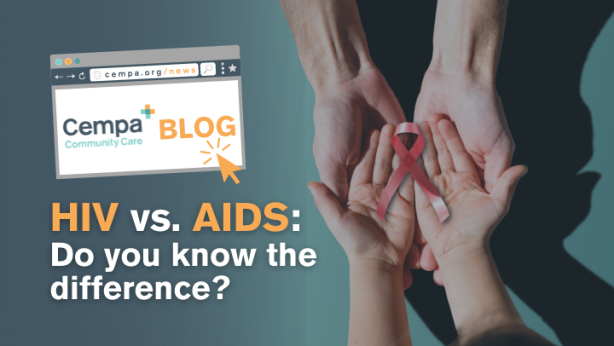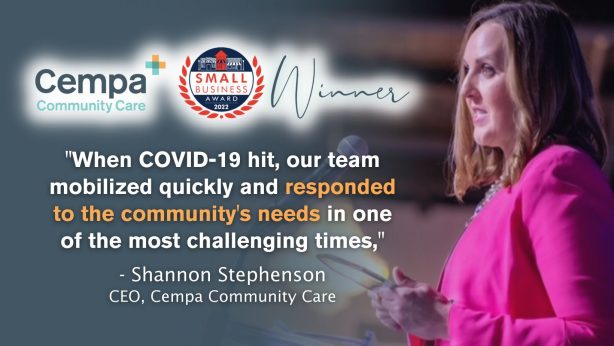Cempa + AHA: Partnering to Shine a Light on Heart Health
February is American Heart Month, offering an opportunity to raise awareness about the importance of protecting your heart. It also offers the perfect opportunity to shine a light on some lesser-known services offered through Cempa Community Care.
While you may think of Cempa as an organization dedicated to sexual health and the prevention and treatment of conditions like HIV and AIDS, our mission has expanded over the years. We now strive to provide underserved groups within our community a fuller spectrum of healthcare, including primary care services.
As part of that mission, we’ve partnered with the American Heart Association. Heart health is undeniably a key part of overall health, and people within the communities we serve often face significant heart health challenges. Together, we’re dedicated to helping them understand those challenges and overcome them.
“Our partnership began about four years ago, when we saw a real need for more community impact programming focused on heart health,” says Terran Anderson, Community Impact Director for the Chattanooga American Heart Association. “Through the Go Red for Women campaign, we worked together to educate women about their overall health, and that really overlapped a good bit with what Cempa was doing.”
That original relationship expanded over time, as Anderson moved into a new role.
“When I took over this role, we looked at what organizations would be good collaborators,” Anderson says. “That’s about the time that Cempa’s clinic opened, and there was a good opportunity for us to talk about overall heart health through Cempa. I’m really passionate about reaching all areas of Chattanooga. We want everyone to have a longer, healthier life. That’s really where this collaboration came from.”
A Focus on LGBTQ Heart Health Challenges
While the partnership between the American Heart Association and Cempa provides heart health resources for anyone within the community who accesses Cempa services, the organizations put a particular emphasis on those within the LGBTQ community.
While there’s not a ton of definitive research about heart health in correlation with sexual orientation or gender identity, it is well-known that those within this community have a number of heart health risk factors.
“There’s clear science that we have failed our LGBTQ adults in ensuring their physical and mental health,” Anderson says. “We know they have more risk factors, like high body mass index, diabetes, and tobacco use. They also have social determinants that are tied with poor heart health, such as a higher poverty rate. We know there’s a need for more awareness about heart health in this population.”
To understand the challenges they face, take one risk factor for example: Those within the LGBTQ community are much more likely to smoke — in fact, according to the American Heart Association, they’re 2.5 times more likely to smoke cigarettes and nearly twice as likely to smoke e-cigarettes.
Why is that? In large part, it’s due to a preponderance of advertising that targets this community, appearing in locations they frequent, publications they receive, and communities in which they live.
“Similarly to how we’re working to reduce disparities in other communities, we want to do the same here,” Anderson says. “Your faith, your gender, your identity should not be determining factors in whether or not you can stay healthy. We want to make sure that there are resources available for those of every walk of life. We want to make sure they have tools and resources readily available for access — that there are no barriers to care.”
Steps You Can Take to Protect Your Heart
While heart disease is the leading cause of death among both men and women, there are things you can do to limit your risk. Incorporating heart-healthy habits is a good place to begin.
- Exercise regularly. Aim to get moving and get your heart pumping faster for at least 30 minutes on most days.
- Eat a diet filled with fruits and veggies. Half of your plate at meals should be filled with these antioxidant-rich foods. The other half should contain a small serving of lean protein, either plant-based, fish, or meat, and a whole grain.
- Don’t smoke. Tobacco kills more than 480,000 people annually, and it’s a major risk factor for heart problems.
- Get quality sleep. Aim to get between seven and nine hours of sleep each night.
It’s also important to know your personal risk factors and keep a careful eye on them.
“We want everybody to know their numbers — blood pressure, cholesterol, blood sugar, and body mass or waist circumference,” Anderson says. “These are huge to us. Knowing those things, as well as your family medical history, is extremely important in determining your risk of heart disease.”
What’s Anderson’s biggest message for American Heart Month and beyond?
“Talk with your doctor about heart disease and stroke,” Anderson says. “Be an advocate for yourself. Ask questions and wait for answers. Have active conversations. And be sure to see a primary care provider regularly, like the doctors at Cempa.”
Cempa Community Care offers a wide range of services to those within the greater Chattanooga area, including primary care. During a primary care visit, you can talk with a provider about your heart health and have your weight, blood pressure, blood sugar, and cholesterol checked.



